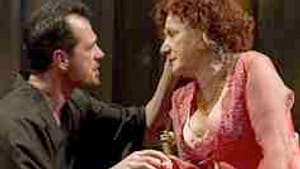Stay in the Loop
BSR publishes on a weekly schedule, with an email newsletter every Wednesday and Thursday morning. There’s no paywall, and subscribing is always free.
Olympia triumphant, Tennessee recumbent
"The Milk Train' in New York

When Tennessee Williams's The Milk Train Doesn't Stop Here Anymore opened on Broadway for the second time, in 1964, it starred Tallulah Bankhead as the dying, filthy rich Mrs. Goforth. Her secretary was played by Marian Seldes and the sexy Angel of Death was played by Tab Hunter. It closed after five performances.
Well, The Milk Train has made another stop, off-Broadway this time, and directed by Michael Wilson. Dripping with Southern accents, roaring with sexual hunger, it is Tennessee to the max: overwrought and fabulous, starring Olympia Dukakis, who plays it with an urgency that makes even the most ludicrous scenes and even the most ridiculous lines believable. As she tells the audience, "Everything's urgentissimo here this summer…."
Everything is urgent because Mrs. Goforth is dying in her villa near Capri, living on morphine injections and pills and brandy. (Sound familiar? Williams's plays are all autobiographies, from one angle or another.) She is dictating her memoirs (four husbands— all dead— mad parties, nasty gossip, diamond-studded Bulgari cigarette lighters) to her prim, recently widowed secretary, Blackie.
79-year-old vigor
Dukakis, who is an astonishing 79, is terrific. What courageous lack of vanity she displays, what relentless vigor; even her "Mmmm" that punctuates sentences radiates charm to burn.
When she declares, "The dead are dead and the living are living!" she has shown us exactly what her character means. And when she appears in full kabuki regalia, and performs a fan-snapping dance, it's impressive and hilarious and heartbreaking. Unlike any of the other cast members, she gives us the entire spectrum from tragic to parodic.
Maggie Lacey as Blackie reveals too little of the secretary's character— neither her exasperation with nor her sympathy for her employer is sufficiently visible. Are we to see Blackie's presence as a kindness or an exploitation?
Dispassionate passion
And what are we to make of Blackie's love scenes with Christopher Flanders, the handsome, self-admiring parasite who comes calling? There seems no likelihood of passion between them, or of a crueler collusion, as both of them wait for the old lady to die. But ambiguity must be conveyed— not just assumed or wished-for.
The same problem exists with Darren Pettie's portrayal of Chris Flanders; he looks good, but his delivery is so noncommittal, so uninteresting, that we can't we even half-believe his Hindu mission, his "gift" for helping the old rich to "go forth."
Chris claims to be a poet, but even Flora Goforth knows that "To be good, a poem's got to be tough, and to write a good, tough poem you've got to cut your teeth on the marrow bone of this world." But despite her shrewd insight into people and the world, Flora falls for his blandishments: He is so virile and she is so lonely, so old, so terrified of death.
The queen steals the show
What was originally written as a woman's role, "The Witch of Capri," a vicious scandal- monger, is here played by Edward Hibbert, who queens it up like mad, nearly stealing the show with his deliciously bitchy moments.
The set (designed by Jeff Cowie) adds to the excess with opulence akimbo and an enormous gilt cupid hanging amid the bougainvillea.
Explaining to The Witch that she must have met Christopher Flanders before, Mrs. Goforth remarks, "Oh, somewhere, sometime, when I was still meeting people, before they all seemed like the same person over and over, and I got tired of the— person." We've met her before, too. In the catalogue of Tennessee's life-demanding, devouring women (Maggie the Cat, Amanda Wingfield, Blanche du Bois, Princess Kosmonopolis, Maxine Faulk), Flora Goforth holds her place. They all are "working against time." Well, who isn't?
Milk Train may not be a great play (well, maybe not even a good play). But for Williams fans, it has to be seen, and this is the production to see.♦
To read a response, click here.
Well, The Milk Train has made another stop, off-Broadway this time, and directed by Michael Wilson. Dripping with Southern accents, roaring with sexual hunger, it is Tennessee to the max: overwrought and fabulous, starring Olympia Dukakis, who plays it with an urgency that makes even the most ludicrous scenes and even the most ridiculous lines believable. As she tells the audience, "Everything's urgentissimo here this summer…."
Everything is urgent because Mrs. Goforth is dying in her villa near Capri, living on morphine injections and pills and brandy. (Sound familiar? Williams's plays are all autobiographies, from one angle or another.) She is dictating her memoirs (four husbands— all dead— mad parties, nasty gossip, diamond-studded Bulgari cigarette lighters) to her prim, recently widowed secretary, Blackie.
79-year-old vigor
Dukakis, who is an astonishing 79, is terrific. What courageous lack of vanity she displays, what relentless vigor; even her "Mmmm" that punctuates sentences radiates charm to burn.
When she declares, "The dead are dead and the living are living!" she has shown us exactly what her character means. And when she appears in full kabuki regalia, and performs a fan-snapping dance, it's impressive and hilarious and heartbreaking. Unlike any of the other cast members, she gives us the entire spectrum from tragic to parodic.
Maggie Lacey as Blackie reveals too little of the secretary's character— neither her exasperation with nor her sympathy for her employer is sufficiently visible. Are we to see Blackie's presence as a kindness or an exploitation?
Dispassionate passion
And what are we to make of Blackie's love scenes with Christopher Flanders, the handsome, self-admiring parasite who comes calling? There seems no likelihood of passion between them, or of a crueler collusion, as both of them wait for the old lady to die. But ambiguity must be conveyed— not just assumed or wished-for.
The same problem exists with Darren Pettie's portrayal of Chris Flanders; he looks good, but his delivery is so noncommittal, so uninteresting, that we can't we even half-believe his Hindu mission, his "gift" for helping the old rich to "go forth."
Chris claims to be a poet, but even Flora Goforth knows that "To be good, a poem's got to be tough, and to write a good, tough poem you've got to cut your teeth on the marrow bone of this world." But despite her shrewd insight into people and the world, Flora falls for his blandishments: He is so virile and she is so lonely, so old, so terrified of death.
The queen steals the show
What was originally written as a woman's role, "The Witch of Capri," a vicious scandal- monger, is here played by Edward Hibbert, who queens it up like mad, nearly stealing the show with his deliciously bitchy moments.
The set (designed by Jeff Cowie) adds to the excess with opulence akimbo and an enormous gilt cupid hanging amid the bougainvillea.
Explaining to The Witch that she must have met Christopher Flanders before, Mrs. Goforth remarks, "Oh, somewhere, sometime, when I was still meeting people, before they all seemed like the same person over and over, and I got tired of the— person." We've met her before, too. In the catalogue of Tennessee's life-demanding, devouring women (Maggie the Cat, Amanda Wingfield, Blanche du Bois, Princess Kosmonopolis, Maxine Faulk), Flora Goforth holds her place. They all are "working against time." Well, who isn't?
Milk Train may not be a great play (well, maybe not even a good play). But for Williams fans, it has to be seen, and this is the production to see.♦
To read a response, click here.
What, When, Where
The Milk Train Doesn’t Stop Here Anymore. By Tennessee Williams; Michael Wilson directed. Roundabout Theatre production through April 3, 2011 at Laura Pels Theatre, Steinberg Center, 111 West 46th St., New York. (212) 719-1300 or www.roundabouttheatre.org/pels.
Sign up for our newsletter
All of the week's new articles, all in one place. Sign up for the free weekly BSR newsletters, and don't miss a conversation.

 Toby Zinman
Toby Zinman